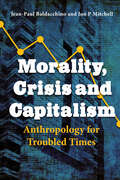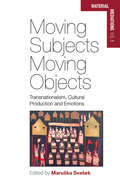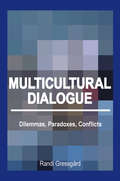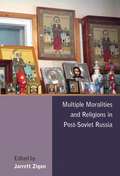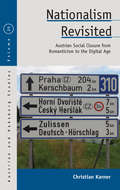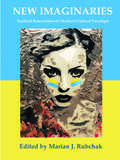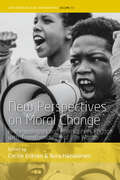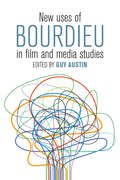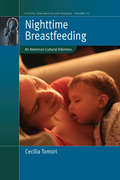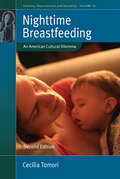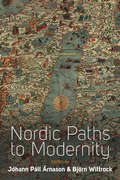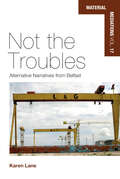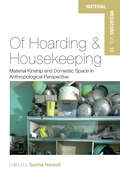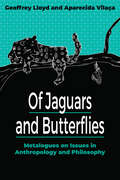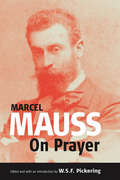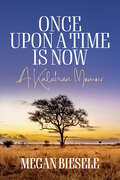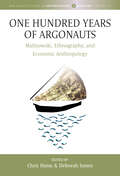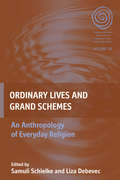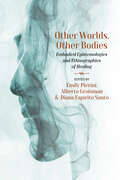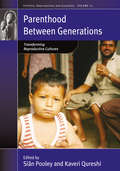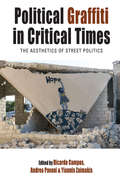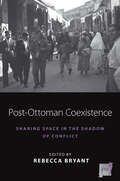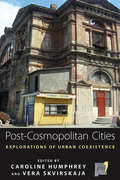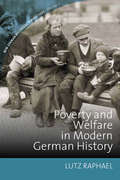- Table View
- List View
Morality, Crisis and Capitalism: Anthropology for Troubled Times
by Jon P. Mitchell Jean-Paul Baldacchino'May you live in interesting times’ was made famous by Sir Austen Chamberlain. The premise is that ‘interesting times’ are times of upheaval, conflict and insecurity - troubled times. With the growing numbers of displaced populations and the rise in the politics of fear and hate, we are facing challenges to our very ‘species-being’. Papers in the volume include ethnographic studies on the ‘refugee crisis’, the ‘financial crisis’ and the ‘rule of law crisis' in the Mediterranean as well as the crisis of violence and hunger in South America.
Moving Subjects, Moving Objects
by Maruška SvašekIn recent years an increasing number of scholars have incorporated a focus on emotions in their theories of material culture, transnationalism and globalization, and this book aims to contribute to this field of inquiry. It examines how 'emotions' can be theorized, and serves as a useful analytical tool for understanding the interrelated mobility of humans, objects and images. Ethnographically rich, and theoretically grounded case studies offer new perspectives on the relations between migration, material culture and emotions. While some chapters address the many different ways in which migrants and migrant artists express their emotions through objects and images in transnational contexts, other chapters focus on how particular works of art, everyday objects and artefacts can evoke feelings specific to particular migrant groups and communities. Case studies also analyse how artists, academics and policy makers can stimulate positive interaction between migrants and non-migrant communities.
Multicultural Dialogue
by Randi GressgårdAs cross-cultural migration increases democratic states face a particular challenge: how to grant equal rights and dignity to individuals while recognizing cultural distinctiveness. In response to the greater number of ethnic and religious minority groups, state policies seem to focus on managing cultural differences through planned pluralism. This book explores the dilemmas, paradoxes, and conflicts that emerge when differences are managed within this conceptual framework. After a critical investigation of the perceived logic of identity, indicative of Western nation-states and at the root of their pluralistic intentions, the author takes issue with both universalist notions of equality and cultural relativist notions of distinctiveness. However, without identity is it possible to participate in dialogue and form communities? Is there a way out of this impasse? The book argues in favor of communities based on nonidentitarian difference, developed and maintained through open and critical dialogue.
Multiple Moralities And Religions In Post-soviet Russia
by Jarrett ZigonIn the post-Soviet period morality became a debatable concept, open to a multitude of expressions and performances. From Russian Orthodoxy to Islam, from shamanism to Protestantism, religions of various kinds provided some of the first possible alternative moral discourses and practices after the end of the Soviet system. This influence remains strong today. Within the Russian context, religion and morality intersect in such social domains as the relief of social suffering, the interpretation of history, the construction and reconstruction of traditions, individual and social health, and business practices. The influence of religion is also apparent in the way in which the Russian Orthodox Church increasingly acts as the moral voice of the government. The wide-ranging topics in this ethnographically based volume show the broad religious influence on both discursive and everyday moralities. The contributors reveal that although religion is a significant aspect of the various assemblages of morality, much like in other parts of the world, religion in postsocialist Russia cannot be separated from the political or economic or transnational institutional aspects of morality.
Nationalism Revisited: Austrian Social Closure from Romanticism to the Digital Age (Austrian and Habsburg Studies #25)
by Christian KarnerFocused on the German-speaking parts of the former Habsburg Empire, and on present-day Austria in particular, this book offers a series of highly innovative analyses of the interplay of nationalism’s discursive and institutional facets. Here, Christian Karner develops a distinctive perspective on Austrian nationalism over the longue durée, tracing nationalistic ways of thinking and mobilizing from the late eighteenth century to the present. Through close analyses of key texts representing diverse settings and historical episodes, this book traces the connections, continuities and ruptures that have characterized the varieties of Austrian nationalism.
New Imaginaries: Youthful Reinvention of Ukraine's Cultural Paradigm
by Marian J. RubchakHaving been spared the constraints imposed on intellectual discourse by the totalitarian regime of the past, young Ukrainian scholars now engage with many Western ideological theories and practices in an atmosphere of intellectual freedom and uncensored scholarship. Displacing the Soviet legacy of prescribed thought and practices, this volume’s female contributors have infused their work with Western elements, although vestiges of Soviet-style ideas, research methodology, and writing linger. The result is the articulation of a “New Imaginaries” — neither Soviet nor Western — that offers a unique approach to the study of gender by presenting a portrait of Ukrainian society as seen through the eyes of a new generation of feminist scholars.
New Perspectives on Moral Change: Anthropologists and Philosophers Engage with Transformations of Life Worlds (WYSE Series in Social Anthropology #13)
by Nora Hämäläinen Cecilie EriksenThe world we live in is constantly changing. Climate change, transforming gender conceptions, emerging issues of food consumption, novel forms of family life and technological developments are altering central areas of our forms of life. This raises questions of how to cope with and understand the moral changes implicit in such alterations. This volume is the first to address moral change as such. It brings together anthropologists and philosophers to discuss how to study and theorize the change of norms, concepts, emotions, moral frameworks and forms of personhood.
New Uses of Bourdieu in Film and Media Studies
by Guy AustinThrough his influential work on cultural capital and social mobility, the French sociologist Pierre Bourdieu has provided critical insights into the complex interactions of power, class, and culture in the modern era. Ubiquitous though Bourdieu's theories are, however, they have only intermittently been used to study some of the most important forms of cultural production today: cinema and new media. With topics ranging from film festivals and photography to constantly evolving mobile technologies, this collection of essays demonstrates the enormous relevance that Bourdieu's key concepts hold for the field of media studies, deploying them as powerful tools of analysis and forging new avenues of inquiry in the process.
Nighttime Breastfeeding: An American Cultural Dilemma (Fertility, Reproduction and Sexuality: Social and Cultural Perspectives #26)
by Cecília TomoriNighttime for many new parents in the United States is fraught with the intense challenges of learning to breastfeed and helping their babies sleep so they can get rest themselves. Through careful ethnographic study of the dilemmas raised by nighttime breastfeeding, and their examination in the context of anthropological, historical, and feminist studies, this volume unravels the cultural tensions that underlie these difficulties. As parents negotiate these dilemmas, they not only confront conflicting medical guidelines about breastfeeding and solitary infant sleep, but also larger questions about cultural and moral expectations for children and parents, and their relationship with one another.
Nighttime Breastfeeding: An American Cultural Dilemma (Fertility, Reproduction and Sexuality: Social and Cultural Perspectives)
by Cecília TomoriNew parents in the United States are caught between responding to infant needs for closeness and breastfeeding, and cultural and medical norms that emphasize solitary sleep. This anthropological investigation shows that nighttime closeness and breastfeeding are the evolutionary and cross-cultural norm, but recent sociocultural shifts produced novel ideals of separation. The book uncovers how breastfeeding parents rework these cultural ideals. In this new edition, the author describes shifting medical guidance that increasingly supports breastfeeding yet remains largely separated from infant sleep guidance. The volume also provides a path towards more equitable approaches to nighttime infant care grounded in reproductive justice.
Nordic Paths To Modernity
by Bjorn Wittrock Johann Pall ArnasonWithin the growing attention to the diverse forms and trajectories of modern societies, the Nordic countries are now widely seen as a distinctive and instructive case. While discussions have centred on the 'Nordic model' of the welfare state and its record of adaptation to the changing global environment of the late twentieth century, this volume's focus goes beyond these themes. The guiding principle here is that a long-term historical-sociological perspective is needed to make sense of the Nordic paths to modernity; of their significant but not complete convergence in patterns, which for some time were perceived as aspects of a model to be emulated in other settings; and of the specific features that still set the five countries in question (Denmark, Sweden, Norway, Finland and Iceland) apart from one another. The contributors explore transformative processes, above all the change from an absolutistmilitary state to a democratic one with its welfarist phase, as well as the crucial experiences that will have significant implications on future developments.
Not the Troubles: Alternative Narratives from Belfast (Material Mediations: People and Things in a World of Movement)
by Karen LaneBelfast is often analysed as a divided society, anchored in ethno-politico-religious differences amid a long history of conflict. However, shifting the focus of academic attention reveals a range of alternative narratives of city life. Using storytelling as a leitmotif, this ethnographic account explores the epistemological validity of engaging with strangers in a range of settings, such as street corners, a hairdresser’s and a storytelling evening. It considers how creative writers represent life in Belfast. The author employs a variety of methods, including a dog as a research assistant and storytelling on location which demonstrates how people can re-shape and re-narrate life in Belfast.
Of Hoarding and Housekeeping: Material Kinship and Domestic Space in Anthropological Perspective (Material Mediations: People and Things in a World of Movement #13)
by Sasha NewellHoarding has largely been approached from a psychological and universal perspective, and decluttering from an aesthetic and ecological one, while little work has been done to think about the cultural and global economic aspects of these phenomena. Of Hoarding and Housekeeping provides an anthropological, global, and comparative angle to the understanding of hoarding and decluttering using cases from a variety of countries including US, Japan, India, Cameroon, and Argentina. Focusing on the house, with careful attention to material flows in and out, this book examines practices of accumulation, storage, decluttering, and waste as practices of kinship and the objects themselves as material kin.
Of Jaguars and Butterflies: Metalogues on Issues in Anthropology and Philosophy
by Aparecida Vilaça Geoffrey LloydWhat are we to make of statements that jaguars see themselves as humans, or of doubts about the boundary between dreams and waking? Jointly authored by an anthropologist and a philosopher, this book investigates some of the most puzzling ideas and practices reported in modern ethnography and ancient philosophy, concerning humans, animals, persons, spirits, agency, selfhood, consciousness, nature, life, death, disease and health. The study’s twin aims are first to explore the possibility of achieving a better understanding of the materials we discuss and then to see what lessons we can draw from them to challenge and revise our own fundamental assumptions.
On Prayer
by W.S.F. Pickering Marcel MaussMarcel Mauss (1872-1950) never completed his Doctoral thesis on prayer. Yet his scarcely mentioned introduction (Books I and II) of 176 pages and privately printed in 1909, can be seen as some of his most important work. His argument that much of prayer is a social act will be of great interest to anthropologists, sociologists and theologians.<P><P> Here, the first English translation to be published, is preceded by a general introduction by W.S.F.Pickering and finally a specific commentary on Mauss's use of ethnographic material.
Once Upon a Time is Now: A Kalahari Memoir
by Megan BieseleFifty years after her first fieldwork with Ju/'hoan San hunter-gatherers, anthropologist Megan Biesele has written this exceptional memoir based on personal journals she wrote at the time. The treasure trove of vivid learning experiences and nightly ponderings she found has led to a memoir of rare value to anthropology students and academics as well as to general readers. Her experiences focus on the long-lived healing dance, known to many as the trance dance, and the intricate beliefs, artistry, and social system that support it. She describes her immersion in a creative community enlivened and kept healthy by that dance, which she calls "one of the great intellectual achievements of humankind." From the Preface: A few years ago I finally got around to looking back into the box of personal field journals I had not opened for over forty years. I found a treasure trove. It was an overwhelming experience. So much that I had forgotten came vividly alive: I laughed, wept, and was terrified all over again at my temerity in taking on what I had taken on. To do justice to the richness of these notebooks, I realized, I would have to do a completely different sort of writing from anything I had ever done before.
One Hundred Years of Argonauts: Malinowski, Ethnography and Economic Anthropology (Max Planck Studies in Anthropology and Economy #13)
by Deborah James Chris HannMalinowski’s Argonauts of the Western Pacific was a major contribution to anthropological theory and method, while simultaneously establishing the sub-field of economic anthropology. Even a century after its publication, Malinowski’s pioneering work remains critical for anthropology in a postcolonial age. This volume uses ethnographic studies from around the world to contextualize the work politically and intellectually, examining its gestation and influence from multiple perspectives. It critically explores the meaning of “economy” for Malinowski from his formation in the Austro-Hungarian Empire to his path-breaking fieldwork in Melanesia and ensuing career in London.
Ordinary Lives And Grand Schemes
by Samuli Schielke Liza DebevecEveryday practice of religion is complex in its nature, ambivalent and at times contradictory. The task of an anthropology of religious practice is therefore precisely to see how people navigate and make sense of that complexity, and what the significance of religious beliefs and practices in a given setting can be. Rather than putting everyday practice and normative doctrine on different analytical planes, the authors argue that the articulation of religious doctrine is also an everyday practice and must be understood as such.
Other Worlds, Other Bodies: Embodied Epistemologies and Ethnographies of Healing
by Emily Pierini, Alberto Groisman, and Diana Espírito SantoWhen approaching the multiplicity of the spiritual experiences of healing, ethnographers are often presented with ideas of the existence of “other” worlds that may intersect with the so-called “material” or “physical” worlds. This book proposes a sensory ethnography of healing with a focus on ethnographic knowing as embedded in an embodied epistemology of healing. Epistemological embodiment signals that personal scholarly experience of the “unknown”—be it in the form of trance, or as the embodiment of an “other”—shapes the concepts of healing, body, trance, self, and matter by which ethnographers craft out analysis.
Parenthood between Generations: Transforming Reproductive Cultures
by Siân Pooley Kaveri QureshiRecent literature has identified modern "parenting" as an expert-led practice-one which begins with pre-pregnancy decisions, entails distinct types of intimate relationships, places intense burdens on mothers and increasingly on fathers too. Exploring within diverse historical and global contexts how men and women make-and break-relations between generations when becoming parents, this volume brings together innovative qualitative research by anthropologists, historians, and sociologists. The chapters focus tightly on inter-generational transmission and demonstrate its importance for understanding how people become parents and rear children.
Political Graffiti in Critical Times: The Aesthetics of Street Politics (Protest, Culture & Society #28)
by Ricardo Campos, Andrea Pavoni Yiannis ZaimakisWhether aesthetically or politically inspired, graffiti is among the oldest forms of expression in human history, one that becomes especially significant during periods of social and political upheaval. With a particular focus on the demographic, ecological, and economic crises of today, this volume provides a wide-ranging exploration of urban space and visual protest. Assembling case studies that cover topics such as gentrification in Cyprus, the convulsions of post-independence East Timor, and opposition to Donald Trump in the American capital, it reveals the diverse ways in which street artists challenge existing social orders and reimagine urban landscapes.
Political Graffiti in Critical Times: The Aesthetics of Street Politics (Protest, Culture & Society #28)
by Ricardo Campos, Andrea Pavoni Yiannis ZaimakisWhether aesthetically or politically inspired, graffiti is among the oldest forms of expression in human history, one that becomes especially significant during periods of social and political upheaval. With a particular focus on the demographic, ecological, and economic crises of today, this volume provides a wide-ranging exploration of urban space and visual protest. Assembling case studies that cover topics such as gentrification in Cyprus, the convulsions of post-independence East Timor, and opposition to Donald Trump in the American capital, it reveals the diverse ways in which street artists challenge existing social orders and reimagine urban landscapes.
Post-Ottoman Coexistence: Sharing Space in the Shadow of Conflict (Space and Place #16)
by Rebecca BryantIn Southeast Europe, the Balkans, and Middle East, scholars often refer to the "peaceful coexistence" of various religious and ethnic groups under the Ottoman Empire before ethnonationalist conflicts dissolved that shared space and created legacies of division. Post-Ottoman Coexistence interrogates ways of living together and asks what practices enabled centuries of cooperation and sharing, as well as how and when such sharing was disrupted. Contributors discuss both historical and contemporary practices of coexistence within the context of ethno-national conflict and its aftermath.
Post-cosmopolitan Cities
by Caroline Humphrey Vera SkvirskajaExamining the way people imagine and interact in their cities, this book explores the post-cosmopolitan city. The contributors consider the effects of migration, national, and religious revivals (with their new aesthetic sensibilities), the dispositions of marginalized economic actors, and globalized tourism on urban sociality. The case studies here share the situation of having been incorporated in previous political regimes (imperial, colonial, socialist) that one way or another created their own kind of cosmopolitanism, and now these cities are experiencing the aftermath of these regimes while being exposed to new national politics and migratory flows of people.
Poverty and Welfare in Modern German History (New German Historical Perspectives #7)
by Lutz RaphaelFor many, the history of German social policy is defined primarily by that nation’s postwar emergence as a model of the European welfare state. As this comprehensive volume demonstrates, however, the question of how to care for the poor has had significant implications for German history throughout the modern era. Here, eight leading historians provide essential case studies and syntheses of current research into German welfare, from the Holy Roman Empire to the present day. Along the way, they trace the parallel historical dynamics that have continued to shape German society, including religious diversity, political exclusion and inclusion, and concepts of race and gender.
